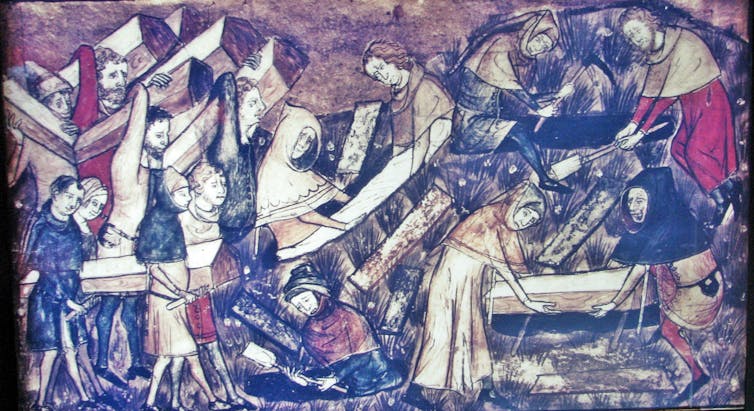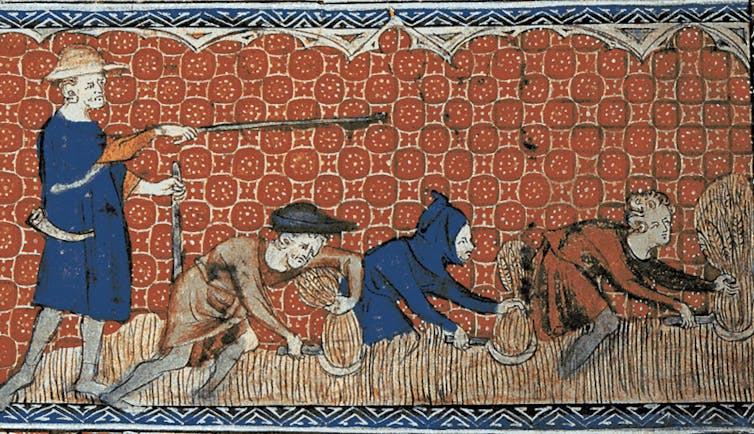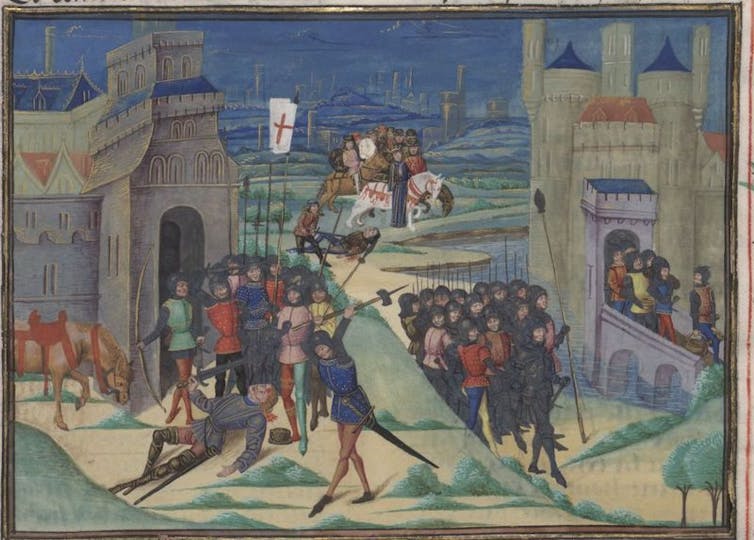
Experts in autocracies have pointed out that it is, unfortunately, easy to slip into normalizing the tyrant, hence it is important to hang on to outrage. These incidents which seem to call for the efforts of the Greek Furies (Erinyes) to come and deal with them will, I hope, help with that. As a reminder, though no one really knows how many there were supposed to be, the three names we have are Alecto, Megaera, and Tisiphone. These roughly translate as “unceasing,” “grudging,” and “vengeful destruction.”
Any time I can’t think of anything else to say, I tend to look at history. And, of course, the Furies are just fine with that, predating history as they do. Just because the COVID-19 is new doesn’t mean that pandemics are new, and we can certainly look at history to see what other forms of collateral damage there might be besides the obvious illness and possible death.
==================================================================
What can the Black Death tell us about the global economic consequences of a pandemic?

Adrian R. Bell, University of Reading; Andrew Prescott, University of Glasgow, and Helen Lacey, University of Oxford
Concerns over the spread of the novel coronavirus have translated into an economic slowdown. Stock markets have taken a hit: the UK’s FTSE 100 has seen its worst days of trading for many years and so have the Dow Jones and S&P in the US. Money has to go somewhere and the price of gold – seen as a stable commodity during extreme events – reached a seven-year high.
A look back at history can help us consider the economic effects of public health emergencies and how best to manage them. In doing so, however, it is important to remember that past pandemics were far more deadly than coronavirus, which has a relatively low death rate.
Without modern medicine and institutions like the World Health Organization, past populations were more vulnerable. It is estimated that the Justinian plague of 541 AD killed 25 million and the Spanish flu of 1918 around 50 million
By far the worst death rate in history was inflicted by the Black Death. Caused by several forms of plague, it lasted from 1348 to 1350, killing anywhere between 75 million and 200 million people worldwide and perhaps one half of the population of England. The economic consequences were also profound.
‘Anger, antagonism, creativity’
It might sound counter-factual – and this should not minimise the contemporary psychological and emotional turmoil caused by the Black Death – but the majority of those who survived went on to enjoy improved standards of living. Prior to the Black Death, England had suffered from severe overpopulation.
Following the pandemic, the shortage of manpower led to a rise in the daily wages of labourers, as they were able to market themselves to the highest bidder. The diets of labourers also improved and included more meat, fresh fish, white bread and ale. Although landlords struggled to find tenants for their lands, changes in forms of tenure improved estate incomes and reduced their demands.
But the period after the Black Death was, according to economic historian Christopher Dyer, a time of “agitation, excitement, anger, antagonism and creativity”. The government’s immediate response was to try to hold back the tide of supply-and-demand economics.

British Library
This was the first time an English government had attempted to micromanage the economy. The Statute of Labourers law was passed in 1351 in an attempt to peg wages to pre-plague levels and restrict freedom of movement for labourers. Other laws were introduced attempting to control the price of food and even restrict which women were allowed to wear expensive fabrics.
But this attempt to regulate the market did not work. Enforcement of the labour legislation led to evasion and protests. In the longer term, real wages rose as the population level stagnated with recurrent outbreaks of the plague.
Landlords struggled to come to terms with the changes in the land market as a result of the loss in population. There was large-scale migration after the Black Death as people took advantage of opportunities to move to better land or pursue trade in the towns. Most landlords were forced to offer more attractive deals to ensure tenants farmed their lands.
A new middle class of men (almost always men) emerged. These were people who were not born into the landed gentry but were able to make enough surplus wealth to purchase plots of land. Recent research has shown that property ownership opened up to market speculation.
The dramatic population change wrought by the Black Death also led to an explosion in social mobility. Government attempts to restrict these developments followed and generated tension and resentment.
Meanwhile, England was still at war with France and required large armies for its campaigns overseas. This had to be paid for, and in England led to more taxes on a diminished population. The parliament of a young Richard II came up with the innovative idea of punitive poll taxes in 1377, 1379 and 1380, leading directly to social unrest in the form of the Peasants’ Revolt of 1381.

Miniature by Jean de Wavrin
This revolt, the largest ever seen in England, came as a direct consequence of the recurring outbreaks of plague and government attempts to tighten control over the economy and pursue its international ambitions. The rebels claimed that they were too severely oppressed, that their lords “treated them as beasts”.
Lessons for today
While the plague that caused the Black Death was very different to the coronavirus that is spreading today, there are some important lessons here for future economic growth. First, governments must take great care to manage the economic fallout. Maintaining the status quo for vested interests can spark unrest and political volatility.
Second, restricting freedom of movement can cause a violent reaction. How far will our modern, mobile society consent to quarantine, even when it is for the greater good?
Plus, we should not underestimate the knee-jerk, psychological reaction. The Black Death saw an increase in xenophobic and antisemitic attacks. Fear and suspicion of non-natives changed trading patterns.
There will be winners and losers economically as the current public health emergency plays out. In the context of the Black Death, elites attempted to entrench their power, but population change in the long term forced some rebalancing to the benefit of labourers, both in terms of wages and mobility and in opening up the market for land (the major source of wealth at the time) to new investors. Population decline also encouraged immigration, albeit to take up low skilled or low-paid jobs. All are lessons that reinforce the need for measured, carefully researched responses from current governments.![]()
Adrian R. Bell, Chair in the History of Finance and Research Dean, Prosperity and Resilience, Henley Business School, University of Reading; Andrew Prescott, Professor of Digital Humanities, University of Glasgow, and Helen Lacey, Lecturer in Late Medieval History, University of Oxford
This article is republished from The Conversation under a Creative Commons license. Read the original article.
==================================================================
“All are lessons that reinforce the need for measured, carefully researched responses from current governments.” Well, we can pretty much rule out receiving that from our current regime – certainly another reason why the current regime has to go, just as soon as it can possibly be managed.
Alecto, Megaera, and Tisiphone, You are already helping us work on getting the regime changed. But if you get a spare moment to do something that helps build morale for public health workers, both in and out of government, it would be appreciated.
The Furies and I will be back.
9 Responses to “Everyday Erinyes #207”
Sorry, the comment form is closed at this time.

Great piece, JD!
Lessons:
1. We need unrest and political volatility to oust the Republican Reich!
2. Quarantine? The Republican Reich wants us all in concentration camps.
Another great read, and for me, learning.
Years ago, I read the frightening book “The Great Influenza” by John Barry. It sure was a page turner.
It was scary then, and it’s still scary today, in what we are experiencing with the COVID-19.
Thank you Joanne, (and Furies) for the post.
Link to the paperback….
https://www.amazon.com/Great-Influenza-Deadliest-Pandemic-History/dp/0143036491?tag=askcomdelta-20
Thanks Joanne–am illuminating historical journey. Gives more foundation to a couple of proposals I’ve seen recently:https://www.huffpost.com/entry/democrats-emergency-paid-sick-days-coronavirus_n_5e628a0dc5b605572804a142?fbclid=IwAR1faqi0TaixAoDaPzXuGTXlCIn6sPfyK5jJZY5oKva3dHwb4DeIXV71MsI
and
https://www.huffpost.com/entry/coronavirus-recession-send-people-money_n_5e614142c5b647a5bd2e908e?fbclid=IwAR3Punz9qmDtlzlhsjA1QCLr5KHXZk6vMi-rufbK_9Xvxc9ANSJCUaEJDaQ
More than I ever knew about the Plague(s), thanks. The corona virus is coming at a different sort of time. The Spanish flu came in as WWI ended, in a devastated Europe, but is still no laughing matter.
Very informative. Adding a couple of trivia notes:
The word “Quarantine”
https://en.wikipedia.org/wiki/Quarantine
The nursery rhyme “Ring Around the Rosie” might have been “inspired” by the Black Death.
Ring-a-round the rosie,
A pocket full of posies,
Ashes! Ashes!
We all fall down.
Not uncommonly, there was a red ring around the lesions from the plague.
They frequently wore satchel or carried flowers and herbs in their pockets to both hide the stench of death and as an amulet to ward off disease.
Ashes – cremation. The English version is “A-tishoo! A-tishoo!” rather than “ashes.” It represents sneezing.
We all fall down – death.
https://www.sporcle.com/blog/2017/08/real-meaning-behind-ring-around-the-rosie/
http://lisaswritopia.com/the-black-death-and-ring-around-the-rosie/
Making lemonade out of lemons – the only bright side to COVID-19 is that it might very well help get rid of *Rump because of his abysmal management of this crisis.
I knew that “quarantine” meant “forty (days),” but not that it came from Italian and involved ships. Ironic that we are not too far into the “forty days” of Lent even as we learn more about this (and keep finding there’s more to learn.)
I had also heard the attribution of “Ring Around” to plague times, but not all the detail, and certainly not the “sneeze” theory. But it makes sense. The reason we say “Bless you” (in whatever language) whee someone sneeze comes from a very old belief that the soul temporarily leaves the body during a sneeze, and the blessing prevents the Devil from grabbing it before it gets back in.
There are similarities between the economic consequences of the Black Death back then and the COVID-19 virus now, but there are also very large differences.
1. The economic future was already a bit bleak, with a possible recession in the books for many countries before COVID-19 started to make headlines.
2: At the moment the stock markets are hard hit but, hard to believe perhaps, they are not ‘the economy’ and a ‘correction’ of the absurd share values had been predicted to occur any day. The bubble was in dire need to be deflated somewhat before it exploded. It now happens to coincide with COVID-19 fears.
3: The Black Death was deadly to all, in its virulent days (1348 to 1350) it killed without discrimination; men, women, children, the young and the old, only a handful survived infection. It decimated the general population, and thus the workforce in many areas of Europe. COVID-19 until now has a very low death-rate and seems to be deadly only in the very old and the infirm. As it stands now, it will not touch overpopulation and will not bring more jobs to survivors as mostly the elderly, who no longer worked, are at risk of dying.
4: Quaranteens, an increasing loss of production and distribution of goods and loss of income for those who are forced to stay home will, however, put the economy under enormous pressure. The demand will remain as before, so prices will increase, similar to after the Black Death, but unlike then many will suffer the consequences of a larger debt, not being able to pay debt/mortgages and foreclosures like those after the financial crises.
5: If governments do not force their banks and moneylenders to forgo aggressive debt collection, as China can do now because the government owns the banks, and handle the COVID-19 virus well and keep the number of infections down (and this costs a lot of money too), this virus could completely disorganize the (global) economy.
Erinyes, I hate to think what the consequences will be in theUS where Trump will want to keep his numbers down no matter what and will simply ignore the COVID-19 going rampant in poorer areas where most people do not have proper health insurance and protection. The poor are the ones who are going to suffer the most. Please do everything in your power, ladies, to make it not so.
Great explanation. Appreciate the informaition.
I too never knew that much about being quarantined or the plague. (Days or origin).
Just that people who had certain diseases or infections had to face being quarantined.
Wish the brainless idiot in the W.H. could read over this.
Thanks Joanne
thank you